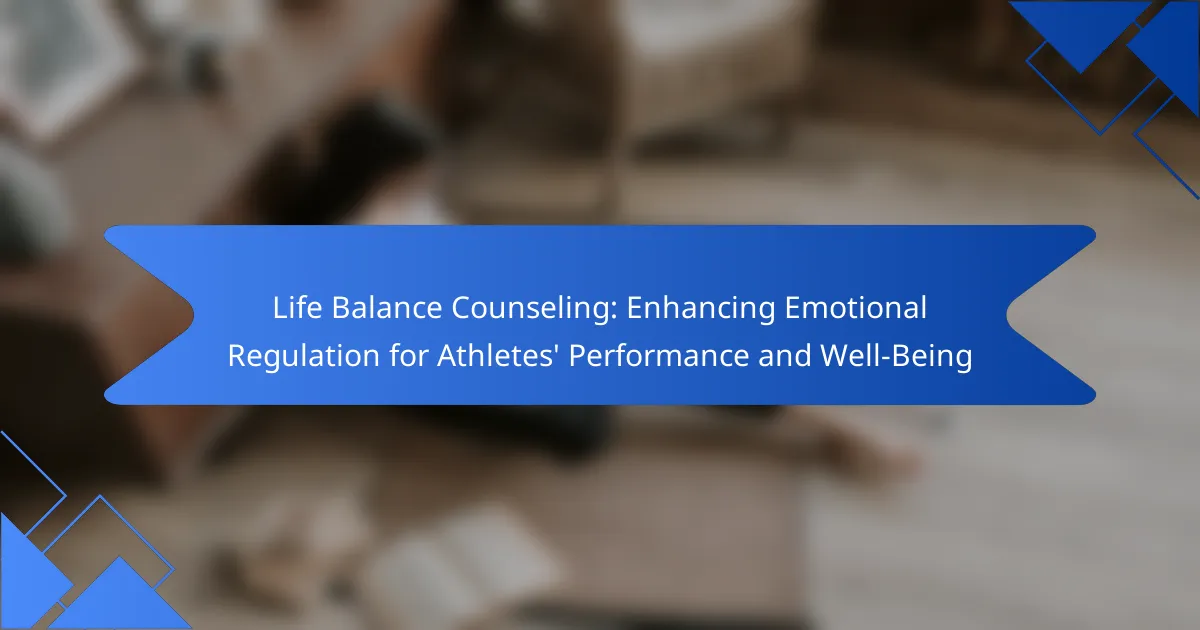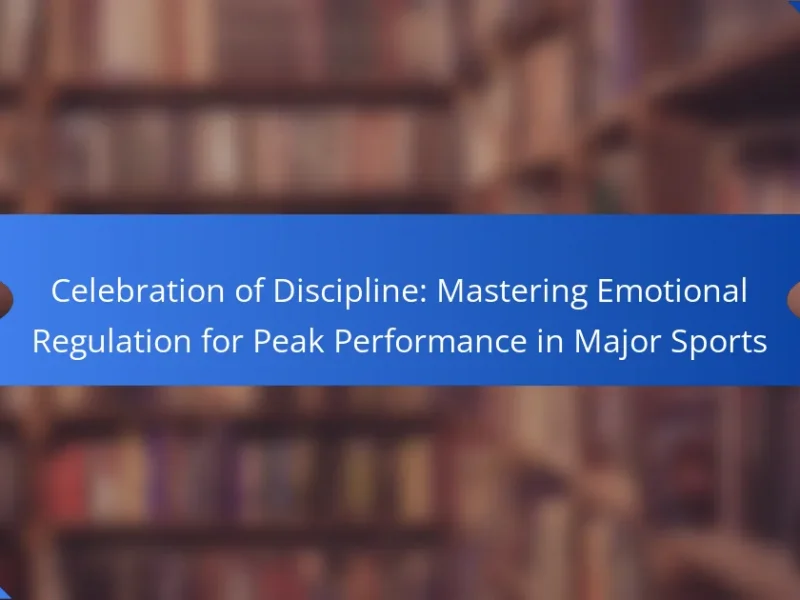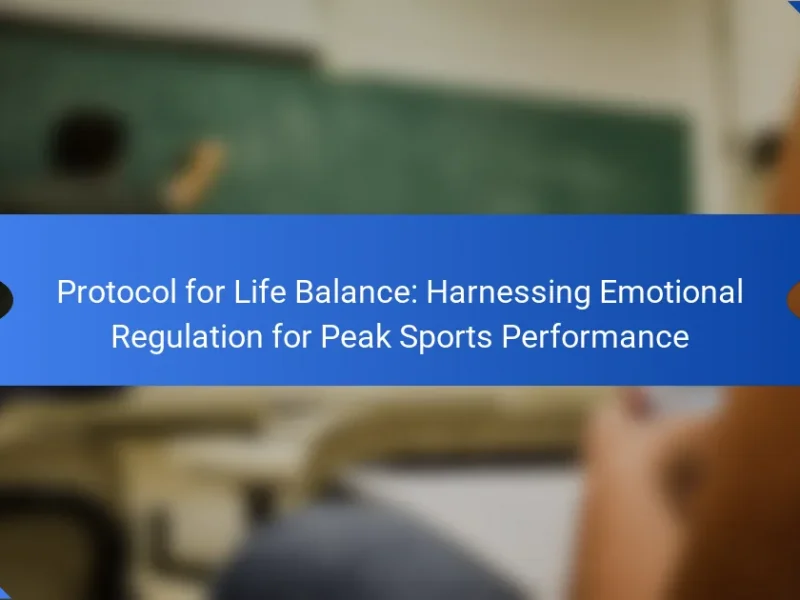Life balance counseling enhances emotional regulation for athletes, addressing the emotional challenges they face. This approach incorporates mindfulness, stress management, and coping techniques. It fosters self-awareness and emotional intelligence while promoting a holistic view of mental, physical, and emotional health. Research indicates that athletes who participate in this counseling experience improved focus, reduced anxiety, and enhanced resilience, leading to better performance and satisfaction.

How Does Life Balance Counseling Support Emotional Regulation in Athletes?
Life balance counseling significantly enhances emotional regulation in athletes by providing tailored strategies and support. This approach focuses on mindfulness, stress management, and coping techniques, which help athletes maintain composure under pressure.
Athletes often face intense emotional challenges, impacting their performance and well-being. Life balance counseling addresses these issues by fostering self-awareness and emotional intelligence. As a result, athletes learn to recognize their emotional triggers and develop healthier responses.
A unique attribute of life balance counseling is its holistic perspective, integrating mental, physical, and emotional health. This comprehensive approach empowers athletes to achieve balance in their lives, ultimately improving their performance and overall satisfaction.
Research shows that athletes who engage in life balance counseling report enhanced focus, reduced anxiety, and improved resilience. These benefits contribute to better performance outcomes and a more fulfilling athletic experience.
What are the key components of emotional regulation systems?
Emotional regulation systems encompass cognitive, physiological, and behavioral components that influence emotional responses. These systems help athletes manage their emotions, enhancing performance and well-being. Key components include awareness of emotional states, strategies for modulation, and adaptive coping mechanisms. For example, mindfulness practices improve emotional awareness, while cognitive restructuring techniques aid in emotional modulation. Additionally, social support plays a crucial role in providing feedback and encouragement, further enhancing emotional regulation.
Why is emotional regulation crucial for athletic performance?
Emotional regulation is crucial for athletic performance because it enhances focus, resilience, and decision-making. Athletes who manage their emotions effectively can maintain composure under pressure, leading to improved outcomes. Research indicates that emotional regulation can reduce anxiety and increase motivation, directly impacting performance levels. Furthermore, athletes with strong emotional regulation skills exhibit better teamwork and communication, which are vital for success in competitive environments.
What role does stress management play in emotional regulation?
Stress management is crucial for emotional regulation, enhancing athletes’ performance and overall well-being. Effective stress management techniques, such as mindfulness and relaxation exercises, can reduce anxiety, improve focus, and promote resilience. Athletes who manage stress effectively often experience better emotional stability, enabling them to perform under pressure. This regulation contributes to a balanced life, supporting both athletic success and mental health.
How can self-awareness enhance emotional regulation?
Self-awareness significantly enhances emotional regulation by allowing athletes to recognize and understand their emotions. This recognition leads to better management of stress and anxiety, which can improve performance. Athletes who practice self-awareness can identify triggers and respond to them more effectively, fostering resilience. Studies show that self-aware individuals often experience higher emotional intelligence, contributing to better decision-making under pressure.
What unique strategies does Life Balance Counseling offer?
Life Balance Counseling offers unique strategies focused on enhancing emotional regulation for athletes. These strategies include personalized emotional intelligence training, mindfulness techniques, and performance-focused therapy sessions. Each approach is designed to improve mental resilience, reduce anxiety, and enhance overall well-being, ultimately leading to better athletic performance.
How does cognitive-behavioral therapy aid emotional regulation?
Cognitive-behavioral therapy (CBT) significantly aids emotional regulation by equipping athletes with practical skills to manage their emotions. CBT teaches techniques to identify negative thought patterns, which can lead to emotional distress. By restructuring these thoughts, athletes enhance their emotional resilience and performance under pressure. Research shows that athletes who engage in CBT demonstrate improved focus and reduced anxiety, leading to better overall well-being. Additionally, CBT fosters a proactive approach to stress management, allowing athletes to maintain a balanced emotional state during competitions.
What techniques are employed in mindfulness-based approaches?
Mindfulness-based approaches employ techniques such as meditation, breathing exercises, body scans, and mindful movement. These methods enhance emotional regulation, promoting better performance and well-being for athletes. Meditation improves focus, while breathing exercises reduce anxiety. Body scans increase body awareness, and mindful movement fosters a connection between mind and body. Each technique contributes uniquely to emotional resilience and stress management.
What are the universal benefits of enhanced emotional regulation?
Enhanced emotional regulation offers universal benefits, including improved focus, better stress management, and enhanced interpersonal relationships. These advantages contribute to athletes’ performance and overall well-being. Effective emotional regulation helps athletes maintain composure under pressure, fostering resilience in competitive environments. As a result, athletes experience increased motivation and a greater sense of life balance. Studies indicate that athletes with strong emotional regulation skills report higher satisfaction and lower anxiety levels. This unique attribute not only enhances performance but also promotes mental health, making emotional regulation essential for athletes.
How does improved focus impact athletic outcomes?
Improved focus significantly enhances athletic outcomes by increasing performance efficiency and emotional regulation. Athletes with better focus can make quicker decisions, maintain composure under pressure, and execute skills with precision. This leads to improved competition results and overall well-being. Enhanced focus also contributes to better training habits, allowing athletes to maximize their potential consistently.
What effect does emotional regulation have on team dynamics?
Emotional regulation significantly enhances team dynamics by fostering collaboration and reducing conflict. Athletes who master emotional regulation experience improved communication and trust within their teams. This leads to increased cohesion and performance, as team members can effectively manage stress and support one another. Studies show that teams with high emotional regulation skills have better problem-solving abilities and achieve greater success in competitive environments. These benefits contribute to overall athlete well-being and performance, highlighting the importance of emotional regulation in team settings.
What rare attributes make Life Balance Counseling effective?
Life Balance Counseling effectively enhances athletes’ emotional regulation through unique attributes like personalized strategies, resilience building, and performance-focused mindfulness. These rare elements foster adaptive coping mechanisms, enabling athletes to manage stress and improve overall well-being.
How does personalized counseling cater to individual athlete needs?
Personalized counseling effectively addresses individual athlete needs by tailoring strategies to enhance emotional regulation. This approach recognizes that each athlete has unique psychological profiles and performance pressures. Custom interventions can improve mental resilience, leading to better focus and emotional stability during competitions. Additionally, personalized counseling can identify specific stressors and coping mechanisms, fostering a supportive environment that promotes overall well-being. This individualized focus ultimately enhances athletic performance by aligning mental health strategies with personal goals and challenges.
What innovative tools are used to track emotional progress?
Innovative tools used to track emotional progress include wearable technology, mobile apps, and biofeedback devices. These tools provide real-time data on emotional states and physiological responses. For example, mood-tracking apps allow athletes to log feelings and stress levels, while wearables can monitor heart rate variability, an indicator of emotional regulation. Biofeedback devices offer insights into stress responses, helping athletes develop coping strategies. These technologies enhance emotional regulation, contributing to improved performance and well-being.
What common mistakes do athletes make in emotional regulation?
Athletes often make mistakes in emotional regulation that hinder their performance. Common errors include neglecting self-awareness, failing to manage stress effectively, and relying on negative self-talk. These mistakes can lead to decreased focus and increased anxiety during competitions. Additionally, many athletes overlook the importance of seeking support from mental health professionals, which can enhance their emotional resilience. Recognizing and addressing these pitfalls is essential for optimizing both performance and overall well-being.
How can athletes optimize their emotional regulation practices?
Athletes can optimize emotional regulation by implementing structured practices. These include mindfulness techniques, cognitive behavioral strategies, and routine emotional check-ins. Mindfulness enhances self-awareness, allowing athletes to recognize emotional triggers. Cognitive behavioral strategies help reframe negative thoughts, promoting a positive mindset. Regular emotional check-ins foster resilience and adaptability, critical for performance under pressure.
What daily routines support emotional well-being?
Daily routines that support emotional well-being include structured physical activity, mindfulness practices, and consistent sleep schedules. Engaging in regular exercise enhances mood and reduces anxiety. Mindfulness practices, such as meditation, improve emotional regulation and focus. Maintaining a consistent sleep schedule promotes mental clarity and resilience. Incorporating these routines can lead to improved performance and overall well-being for athletes.
How can athletes incorporate feedback for continuous improvement?
Athletes can enhance performance by actively incorporating feedback through structured reflection and targeted adjustments. Regularly seeking input from coaches and peers fosters a growth mindset.
Utilizing techniques such as journaling can help athletes track their emotional responses to feedback, promoting emotional regulation. This practice enables them to identify patterns and areas for improvement.
Incorporating feedback loops into training sessions allows athletes to make real-time adjustments, ensuring that skills are honed effectively. This iterative process supports continuous improvement and emotional well-being.
Building a supportive environment where feedback is encouraged enhances athletes’ resilience and adaptability, contributing to their overall performance and life balance.
What expert insights can enhance emotional regulation strategies?
Expert insights can significantly enhance emotional regulation strategies for athletes by incorporating mindfulness, cognitive restructuring, and biofeedback techniques. Mindfulness practices improve focus and reduce anxiety, directly impacting performance. Cognitive restructuring helps athletes reframe negative thoughts, promoting a positive mindset. Biofeedback provides real-time data on physiological responses, enabling athletes to manage stress effectively. Integrating these strategies fosters resilience, leading to improved emotional regulation and overall well-being.


